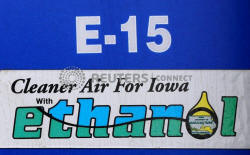Exclusive: Kinder Morgan to expand Chicago ethanol hub
to calm price manipulation concerns - sources
 Send a link to a friend
Send a link to a friend
 [February 20, 2019]
By Jarrett Renshaw [February 20, 2019]
By Jarrett Renshaw
ORLANDO, Fla. (Reuters) - Kinder Morgan Inc
will expand loading capacity at its ethanol terminal in Chicago to
address producer concerns that trade at the terminal - a benchmark for
global ethanol prices - is vulnerable to manipulation, three people
briefed on the company's plans told Reuters.
Tens of thousands of barrels change hand at the hub every day, but many
more barrels across the country depend on the price. Ethanol trade in
the cash market at the Kinder Morgan Argo hub is used in contracts for
the biofuel across the country, and is also baked into international
contracts.
Trade at the terminal has come under scrutiny after one of the world's
largest commodities merchants, Archer Daniels Midland Co, switched from
its typical role as a buyer in late 2017 to a big seller, flooding the
pricing hub with ethanol and helping drive the price to near record
lows.

Farmers are struggling with a loss of export markets due to the U.S.
trade war with China and mixed signals from the Trump administration on
its support of the nation's biofuel laws. Plants have idled or shut
altogether in recent months as U.S. ethanol prices have dropped below
$1.20 a gallon, the lowest in about 13 years.
Kinder Morgan told traders at an industry conference in Orlando, Florida
last week that it plans to at least double the amount of ethanol barges
that can load and unload at its two existing Argo docks and it is
exploring allowing a third petrochemical dock to also move ethanol,
three sources briefed on the meetings told Reuters.
Kinder will also build a new 50,000 barrel-per-day storage tank at its
Stony Island facility near Argo, the sources said. The Stony Island
location loads and unloads ethanol trains.
The additions could be ready before the end of the year, traders said.
Kinder Morgan spokeswoman Lexey Long said the company declined to
comment for the story.
The increased takeaway capacity will make it more difficult to drive up
inventories at the 1.3 million barrel storage hub and drive down price,
traders said.
"If you can send barrels in faster than you can take out, then you can
drive down the price faster and for a longer period. This will help
equalize that and level the playing field," said one ethanol trader.
Currently, Argo can unload roughly 120 to 150 tank cars of ethanol each
week, or roughly 4 million gallons, and can load two barges, or roughly
1.2 million gallons, at a time. Train flows into the terminal fairly
smoothly as tank cars can wait outside of Chicago before unloading, but
bottlenecks at the slower-moving docks have significantly delayed trade
at times, traders said.
[to top of second column] |

A gas pump selling E15, a gasoline with 15 percent of ethanol, is
seen in Mason City, Iowa, United States, May 18, 2015. REUTERS/Jim
Young/File Photo

In the past, Kinder Morgan has proposed expanding capacity but wanted producers
and trading houses to help fund it through long-term contracts.
Not this time, traders said.
"I think they know people are upset and they want to make sure they retain their
customer base," said another trader.
ADM's heavy selling prompted top U.S. ethanol producer POET LLC to ask the CME
Group Inc to change the way it prices a key swap contract that is settled based
on the cash market at Argo. Poet argued that the connection to Argo made the
swap contracts prone to manipulation as well as the cash market.
ADM declined to comment on its commercial activity but said in a statement its
"ethanol trading practices are proper and compliant with all laws and
regulations."
The rival ICE exchange is contemplating offering an alternative to CME's product
after discussions with frustrated biofuels companies, Reuters previously
reported.
Argus Media met with a number of traders earlier this month in Houston to gauge
interest in establishing a new cash benchmark that would rival the existing one
set by S&P Global Platts, sources tell Reuters.
ADM can produce roughly 1.6 billion gallons of ethanol annually, about 10
percent of U.S. capacity. Despite its massive production, it has often been a
buyer on the cash market to supplement its long-term supply deals or to support
a market view, dealers said.
The Illinois-based global commodities powerhouse, a major ethanol producer,
accounted for roughly 61 percent of the 9.5 million barrels sold at the Chicago
hub between November and August of last year, according to the data reviewed by
Reuters.

Late last year, the number went above 70 percent of the sales, Reuters reported.
Previously, ADM had been a regular buyer: In September and October of 2017, for
example, ADM bought 810,000 barrels, 32 percent of the 2.495 million total
trades in the Chicago hub during that stretch, according to the data.
(Reporting by Jarrett Renshaw; Editing by Simon Webb and Lisa Shumaker)
[© 2019 Thomson Reuters. All rights
reserved.] Copyright 2019 Reuters. All rights reserved. This material may not be published,
broadcast, rewritten or redistributed.
Thompson Reuters is solely responsible for this content. |